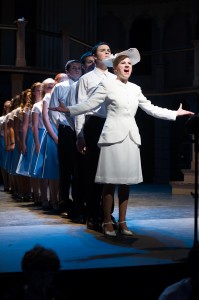By Anastasha Echavarri
News Editor
WATA showcases a part of Argentina’s rich history this week by performing Evita. This main-stage play is about the life-story of Argentinian political figure Eva Perón and her rise and fall from power.
Evita is based off of the real life story of how Eva Perón , an actress, climbed her way up the political ladder and became one of the most beloved women in Argentinian history. During her time in office, she was able to win the adoration of the working class and was proclaimed “spiritual leader” of her country.
The play begins with a funeral procession outside the Casa Rosada, which is the executive house of the president of Argentina. Mourners walk down the aisles of the audience singing a dirge and gathering around a casket as fog begins to roll in. The person whose death they are mourning is no other than Eva Perón herself.
While the procession continues, Che Guevara, another important political figure in Argentina’s history, enters onto the stage for the first time. He is the narrator of the story and looks back on the several scenes that take place during the play.
Che frequently comments throughout the play which gives Evita an extra layer of depth. He is the omniscient narrator who provides the audience with a different point of view.
“He’s really an incredible thinker and just an amazing philosopher,” said junior Nick Nudler, the student who performed the role of Che.
The scenes that follow are a series of flashbacks which begin with Eva Perón’s relationship with a tango singer called Augustin Magaldi. During these scenes she dreams about leaving the working class to live in Buenos Aires, the capital of the country.

Not long after this does she meet and fall in love with Juan Perón , the man who recently became the president of the country.
Sophomore Brandon Jurewicz, the student who plays Perón, attains power during an elaborate fight scene with several other political rivals. The scene ends when, after losing a fight, Perón turns around and shoots the victor in the head.
By the end of the first act, Eva and Perón are flying high and are beloved by all of the working class of Argentina. The aristocracy, however, afraid of giving up their power to the people, turns against Perón which later causes extreme conflict during the second act.
The reason there is a play about Eva Perón’s life is because she fights for the rights of the people who are oppressed by society. It would make sense that she would fight for the wealthier classes. However, Eva fights for those who have no voice.
“Eva was fighting for [the working class] because as she says in the song, she has suffered the way they have,” said senior Tia Ryder, a member of the ensemble in the play.
What makes this play so special are the powerful and inspiring songs that are sung. In fact, there are only a few lines in the entire play that are not sung.
“It’s difficult music. The challenging part is that not only are there big songs like there would be in any musical, but instead of speaking in a play they’d be singing, and the way that Andrew Lloyd Webber wrote it was not simple… You have to teach songs but you also have to teach speech through music,” said music director and history teacher Scott Cruikshank.
Several songs that are extremely powerful include “A New Argentina”, “Don’t Cry for Me Argentina”, “She is a Diamond”, and “Dice are Rolling”. The two most famous songs are the first two, sung primarily by Eva Perón and company.
“A New Argentina” is sung at the end of Act I by senior Jillian Frankel, the student who played Eva Perón. It is an extremely profound song where Eva states that she will strongly advocate for the voice of the people and promises to give them power. Frankel sings the song in such a passionate and sincere way that it ends the act on a compelling note.
Act II begins on a high note with Perón in power while Eva continues to reign in the working class. This is also when the song “Don’t Cry for Me Argentina” is sung by Frankel.
In this song, Eva professes her unfailing devotion for the people of Argentina despite her climb to power and how she will always love them and hopes that they will continue to love her in return.
However, not everyone loves Eva Perón. In Act II, it is made clear that as her popularity increases in the eyes of the working class, the aristocracy and other countries see her in a poor light. Italy calls her a “whore” and England’s royalty refuses to meet with her while she’s on a tour around the world.
Throughout Act II is the growing conflict between Eva and her opposition who fears she is ruining the government and leading her country to ruins. In addition to this, Eva’s health begins to deteriorate because she has developed cervical cancer. Even after a hysterectomy, it is clear that Eva will not recover and Perón must decide what to do for the betterment of his country.
In one impassioned song called “She is a Diamond”, Perón fights on Eva’s behalf against other political officers. They denounce her for what she has done to the country, but Perón makes it clear that it is she who the country loves, not them.
The song following this is called “Dice are Rolling” and is one of the most dramatic and somber moments in the play. A heated dialogue ensues between Eva and Perón because Eva wishes to become vice president despite her failing health. She believes that her people will carry them to success once again, but Perón tries to make her realize that she does not exist politically and that even if she were to succeed, she would not survive.
At the very end, Eva Perón faces her death as she stumbles down the staircase of the Casa Rosada to come face to face with her casket and her mortality. Coming in a full circle, the play ends with Eva dying as the “spiritual leader” of Argentina. Although she is no longer living, she will forever be loved by the working class.







Elfie Echavarri • Nov 19, 2012 at 3:32 pm
The editor did a very good job .I loved to read it and understand it ..It is not an easy play for a High School
Production.
August Echavarri • Nov 19, 2012 at 3:28 pm
I am in awe of this writeup about Evita.by Tasha E. I thought she did a marvelous job of stitching together the many subplots and keeping them above high ground. Again, very impressive. Good job Tasha. Keep it up!